Passionflower tea can greatly improve your sleep quality due to its natural sedative properties. To create a soothing blend, combine two parts passionflower with one part each of chamomile and lemon balm. These herbs work synergistically to reduce anxiety and promote relaxation. Brew the mixture in water heated to 190-200°F for 5-7 minutes. For best results, drink your tea 30-60 minutes before bedtime. You can enhance the flavor with natural sweeteners like honey or stevia. Consider incorporating aromatherapy or creating variations with additional herbs to maximize the calming effects. Exploring the depths of this herbal remedy might just reveal the secret to your best night's sleep yet.
Understanding Passionflower's Sleep-Inducing Properties

Why is passionflower so effective for promoting sleep? The secret lies in its unique composition of bioactive compounds. Passionflower contains flavonoids, alkaloids, and gamma-aminobutyric acid (GABA), which work together to calm your nervous system and induce relaxation.
GABA is particularly important, as it's a neurotransmitter that helps regulate brain activity. When you consume passionflower tea, you're effectively increasing GABA levels in your brain, which can reduce anxiety and promote sleep. The flavonoids in passionflower, such as chrysin and benzoflavone, have been shown to have sedative effects and may help improve sleep quality.
Additionally, passionflower influences serotonin levels, a neurotransmitter that plays a significant role in regulating your sleep-wake cycle. By modulating serotonin, passionflower can help reset your internal clock and make it easier to fall asleep at night.
Research has demonstrated that passionflower can increase total sleep time, reduce the time it takes to fall asleep, and improve overall sleep quality. It's particularly effective for those who struggle with anxiety-related sleep issues, as it addresses both the root cause and the symptoms.
Complementary Herbs for Sleep Support
While passionflower is a potent sleep aid, you can enhance its effects by combining it with other calming herbs.
Chamomile, known as nature's calming agent, can soothe your nerves and promote relaxation.
Valerian root offers powerful sleep benefits, while lemon balm can help ease anxiety and improve your overall sleep quality.
Chamomile: Nature's Calming Agent
Chamomile stands out as one of the most popular herbs for promoting relaxation and better sleep. This daisy-like flower has been used for centuries as a natural remedy for various ailments, including insomnia and anxiety. When you brew chamomile tea, you're tapping into its potent calming properties.
The secret behind chamomile's effectiveness lies in its active compounds, particularly apigenin. This antioxidant binds to specific receptors in your brain, potentially reducing anxiety and initiating sleep. You'll find that drinking chamomile tea before bed can help ease your mind and prepare your body for rest.
Chamomile also offers additional health benefits. It may improve digestion, reduce inflammation, and boost your immune system. These effects can indirectly contribute to better sleep quality by addressing underlying issues that might disrupt your rest.
To incorporate chamomile into your bedtime routine, steep a teaspoon of dried chamomile flowers in hot water for 5-10 minutes. You can enhance its flavor and effectiveness by adding a touch of honey or lemon.
For the best results, drink your chamomile tea about 30 minutes before you plan to sleep.
Valerian Root's Sleep Benefits
Another powerful herb in the sleep-inducing arsenal is valerian root. This perennial plant has been used for centuries to promote relaxation and improve sleep quality. You'll find that valerian root can help you fall asleep faster and enjoy a more restful night.
Valerian root works by increasing the levels of gamma-aminobutyric acid (GABA) in your brain, a neurotransmitter that helps calm your nervous system. It also contains compounds that may reduce anxiety and promote muscle relaxation, further enhancing its sleep-inducing effects.
Here's a quick overview of valerian root's benefits and usage:
| Benefit | Usage |
|---|---|
| Reduces sleep latency | Take 30-60 minutes before bed |
| Improves sleep quality | Use 300-600mg daily |
| Eases anxiety | Available as tea or capsules |
| Promotes relaxation | Can be combined with other herbs |
| Minimal side effects | Consult doctor if pregnant |
When incorporating valerian root into your sleep routine, start with a lower dose and gradually increase it as needed. You may experience its full benefits after a few weeks of consistent use. Remember, while valerian root is generally safe, it's always best to consult with your healthcare provider before adding any new supplement to your regimen.
Lemon Balm for Relaxation
Lemon balm, a fragrant member of the mint family, offers a gentle yet effective way to promote relaxation and improve sleep quality. This herb has been used for centuries to calm nerves and reduce anxiety, making it an excellent addition to your bedtime routine.
When combined with passionflower and valerian root, lemon balm can enhance the overall sleep-inducing effects of your herbal tea blend.
To make the most of lemon balm's relaxation properties, you'll want to:
- Steep 1-2 teaspoons of dried lemon balm leaves in hot water for 5-10 minutes
- Drink the tea 30-60 minutes before bedtime
- Combine it with other sleep-promoting herbs for synergistic effects
- Use fresh lemon balm leaves if available for a more potent flavor
- Consider adding a touch of honey for sweetness and additional health benefits
Lemon balm works by increasing levels of GABA in the brain, a neurotransmitter that helps regulate sleep and reduce stress.
It's also rich in antioxidants, which can support overall health and well-being. You'll find that incorporating lemon balm into your nightly tea ritual can help you unwind, quiet your mind, and prepare your body for a restful night's sleep.
Gathering Ingredients and Equipment

Before diving into the brewing process, you'll need to gather all the necessary ingredients and equipment for your soothing passionflower tea blend.
First, collect the herbs: passionflower, chamomile, and lemon balm. You can find these in dried form at health food stores or online. For added flavor, consider including a small amount of dried lavender or mint.
Next, gather your equipment. You'll need a tea infuser or reusable tea bags to hold the herbs. A teapot or large mug is essential for brewing, and don't forget a kettle to heat the water. If you prefer, use a thermometer to guarantee the water temperature is just right.
For measuring, have a small kitchen scale or measuring spoons on hand. You'll want to be precise with your herb ratios to achieve the perfect blend. A timer can help you keep track of steeping time, ensuring you don't over-brew your tea.
Lastly, prepare a storage container for any leftover herb blend. An airtight glass jar works well to keep your herbs fresh and potent for future use.
Measuring and Blending the Herbs
To create your soothing passionflower tea blend, you'll need to measure the herbs in the right proportions.
Start by using a kitchen scale to weigh out 2 parts passionflower, 1 part chamomile, and 1 part lemon balm.
Once measured, gently mix the herbs together in a bowl, using your hands or a wooden spoon to guarantee an even distribution.
Proper Herb Ratios
Achieving the right balance of herbs in your passionflower tea blend is essential for its effectiveness.
You'll want to create a blend that's both soothing and flavorful. Start with passionflower as your base, making up about 50% of the blend. This herb is known for its calming properties and mild taste.
For the remaining 50%, consider adding these complementary herbs:
- Chamomile: 20% for its relaxing effects
- Lemon balm: 15% to reduce anxiety and promote sleep
- Lavender: 10% for its calming aroma and flavor
- Valerian root: 5% for its potent sleep-inducing properties
Mixing Techniques
Now that you've determined the ideal herb ratios, it's time to focus on the mixing process. Begin by gathering your ingredients and a clean, dry mixing bowl. Measure each herb precisely using a digital scale for accuracy. Start with the largest quantity herb, typically passionflower, and add it to the bowl.
Next, add the remaining herbs one at a time, gently folding them together with a wooden spoon or your clean hands. Avoid vigorous stirring, as this can damage delicate herb pieces and release essential oils prematurely. Instead, use a gentle lifting and folding motion to distribute the herbs evenly throughout the mixture.
For a more thorough blend, consider using the layering technique. Create alternating layers of each herb in a jar, then seal and gently rotate the jar to mix. This method guarantees a consistent distribution of ingredients throughout the blend.
Once mixed, transfer your herbal blend to an airtight container, preferably made of dark glass or ceramic to protect the herbs from light exposure. Store in a cool, dry place to maintain freshness and potency.
Remember to label your container with the blend's name and date of creation.
Proper Storage of Herbal Tea

Proper storage of your herbal tea blend is essential for maintaining its flavor, aroma, and therapeutic properties. Once you've created your passionflower tea blend, you'll want to guarantee it stays fresh for as long as possible.
Store your tea in an airtight container, away from direct sunlight, heat, and moisture. A cool, dark pantry or cupboard is ideal.
Glass jars with tight-fitting lids or opaque ceramic containers work well for tea storage. Avoid plastic containers, as they can absorb odors and affect the tea's taste. If you've purchased your blend in a paper bag, transfer it to a suitable container as soon as possible.
To maximize your tea's shelf life and quality, follow these tips:
- Label your container with the blend's name and date of purchase or mixing
- Keep different tea blends separate to prevent flavor mixing
- Use a clean, dry spoon when scooping tea to avoid introducing moisture
- Store tea away from strong-smelling foods or spices
- Check your tea periodically for signs of staleness or mold
Brewing the Perfect Cup
To brew the perfect cup of passionflower tea, you'll need to pay attention to three key factors.
First, make sure you're using water at the ideal temperature, typically around 200°F (93°C) for herbal teas.
Second, don't rush the steeping process; allow 5-7 minutes for the tea to fully infuse, releasing its beneficial compounds and flavors.
Ideal Water Temperature
When brewing your passionflower tea blend, water temperature plays an essential role in extracting the best flavor and benefits. For passionflower tea, you'll want to use water that's hot but not boiling. The ideal temperature range is between 190°F and 200°F (88°C to 93°C). This allows for the best extraction of the herb's beneficial compounds without scorching the delicate leaves.
To achieve the perfect temperature, you can:
- Bring water to a boil, then let it cool for 1-2 minutes
- Use a temperature-controlled kettle
- Heat water to just below boiling point
- Place a thermometer in your kettle to monitor temperature
- Use the "white bubbles" method (when small bubbles form at the bottom of the pot)
If you don't have a thermometer, you can estimate the temperature by watching the water. When you see tiny bubbles forming at the bottom of the pot, it's usually around the right temperature.
Steeping Time Matters
Steeping your passionflower tea blend for the right amount of time is crucial for achieving the perfect balance of flavor and therapeutic benefits. Generally, you'll want to steep passionflower tea for 5 to 7 minutes. This duration allows the hot water to extract the plant's beneficial compounds, including flavonoids and alkaloids, which contribute to its calming effects.
If you're using a blend that includes other herbs, adjust the steeping time accordingly. For example, chamomile typically requires 3 to 5 minutes, while valerian root may need up to 10 minutes. To guarantee you don't over-steep, set a timer when you begin brewing.
Keep in mind that steeping too long can result in a bitter taste and may reduce the tea's effectiveness. On the other hand, under-steeping mightn't fully release the herbs' therapeutic properties. If you prefer a stronger flavor, consider adding more tea leaves rather than extending the steeping time.
For iced passionflower tea, brew it stronger by steeping for an extra minute or two, as the ice will dilute the flavor.
Proper Tea-To-Water Ratio
In addition to steeping time, achieving the perfect cup of passionflower tea depends on the right tea-to-water ratio. For a balanced brew, you'll want to use about 1 to 2 teaspoons of dried passionflower herbs per 8 ounces of water. This ratio guarantees that you're extracting the ideal amount of flavor and beneficial compounds without making the tea too weak or overpoweringly strong.
To help you brew the perfect cup, keep these tips in mind:
- Use filtered water for a cleaner taste
- Measure your tea leaves accurately with a proper teaspoon
- Adjust the ratio slightly based on personal preference
- Consider using a tea infuser for easier cleanup
- Experiment with different ratios to find your ideal strength
Remember that the tea-to-water ratio can affect not only the taste but also the potency of the sleep-inducing properties of passionflower tea.
If you find the flavor too strong, don't hesitate to add more hot water after brewing. Conversely, if it's too weak, try using a bit more tea next time.
With practice, you'll quickly discover your preferred ratio for a soothing and effective bedtime brew.
Ideal Consumption Time and Frequency
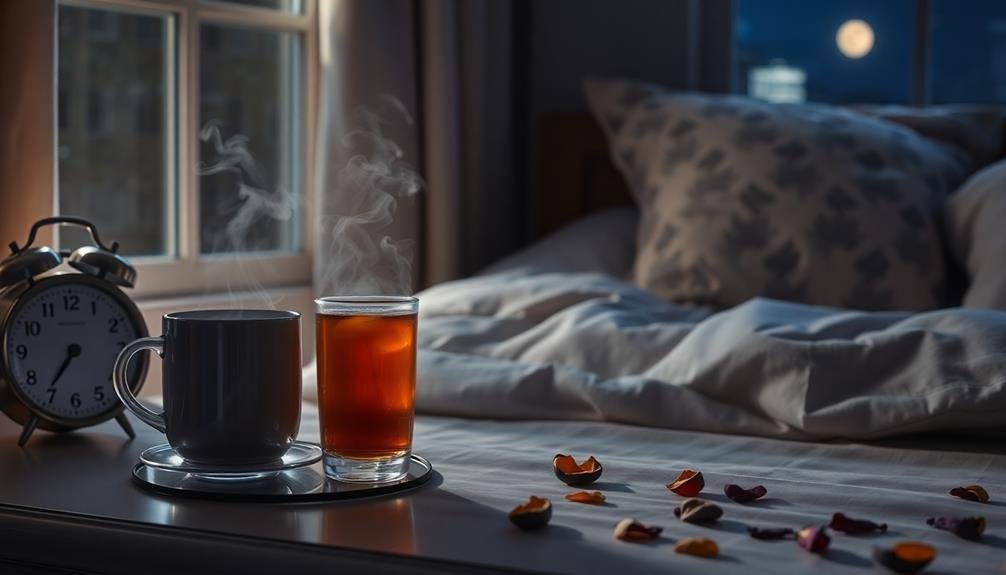
To get the most benefit from your passionflower tea blend, timing is essential. Aim to drink your tea about 30 to 60 minutes before bedtime. This allows enough time for the calming compounds to take effect, helping you relax and prepare for sleep.
Don't consume it too early in the evening, as you might miss out on its sleep-inducing benefits.
As for frequency, you can safely drink passionflower tea daily. However, it's best to start with 2-3 cups per week and gradually increase if needed. This approach helps you gauge your body's response and avoid potential side effects.
If you're new to passionflower tea, begin with a single cup in the evening to assess its impact on your sleep quality.
Remember that while passionflower tea is generally safe, it's not recommended to consume it long-term without breaks. Consider taking a week off every month to prevent your body from building a tolerance.
If you're pregnant, nursing, or taking medications, consult your healthcare provider before incorporating passionflower tea into your routine.
Potential Side Effects and Precautions
While passionflower tea is generally considered safe, it's important to be aware of potential side effects and take necessary precautions. Some people may experience mild side effects such as dizziness, confusion, or drowsiness. If you're pregnant, breastfeeding, or have a medical condition, consult your healthcare provider before consuming passionflower tea.
Be cautious when combining passionflower tea with other medications, especially sedatives or blood thinners, as it may interact with them. Don't drive or operate heavy machinery after drinking this tea, as it can cause drowsiness. If you experience any unusual symptoms, discontinue use and seek medical advice.
Here are some precautions to keep in mind:
- Don't exceed recommended dosages
- Avoid long-term use without consulting a healthcare professional
- Stop use at least two weeks before scheduled surgery
- Don't give passionflower tea to children without medical supervision
- Be aware of potential allergic reactions, especially if you're sensitive to plants in the Passifloraceae family
Enhancing Flavor With Natural Sweeteners
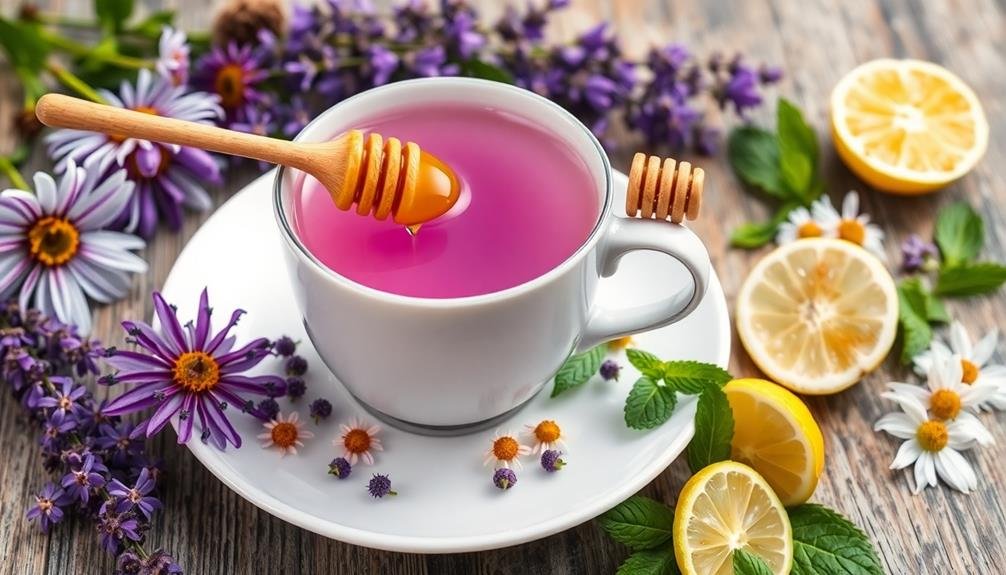
Now that we've covered safety considerations, let's explore ways to make your passionflower tea even more enjoyable.
While passionflower tea has a mild, earthy flavor, you can enhance its taste with natural sweeteners. Honey is a popular choice, offering a subtle sweetness and additional health benefits. You'll find that raw honey works best, as it retains more nutrients than processed varieties.
If you're looking for a low-calorie option, try stevia. This natural, zero-calorie sweetener comes from the leaves of the stevia plant and won't spike your blood sugar. You can use it in liquid or powdered form, but remember that a little goes a long way.
For a unique twist, consider adding a touch of maple syrup. Its rich flavor complements the earthiness of passionflower tea wonderfully.
Alternatively, agave nectar provides a smooth sweetness that blends well with herbal teas.
If you prefer a fruity note, try stirring in a small amount of apple or pear juice. These natural sweeteners not only enhance the flavor but also contribute additional vitamins and minerals to your bedtime brew.
Incorporating Aromatherapy for Better Results
Incorporating aromatherapy into your passionflower tea ritual can greatly enhance its sleep-inducing effects. As you prepare your tea, consider adding essential oils known for their calming properties. Lavender, chamomile, and ylang-ylang are excellent choices to complement passionflower's relaxing qualities.
You can use a diffuser near your bed or add a few drops of essential oil to your pillowcase. Another option is to create a soothing room spray by mixing water and essential oils in a spray bottle. As you sip your passionflower tea, breathe deeply and allow the aromatic scents to envelop you.
To maximize the benefits of aromatherapy with your passionflower tea, try these tips:
- Use high-quality, pure essential oils
- Experiment with different scent combinations
- Apply a diluted essential oil blend to your wrists or temples
- Create a relaxing atmosphere with dim lighting and soft music
- Practice deep breathing exercises while enjoying your tea and aromatherapy
Creating Variations of the Blend
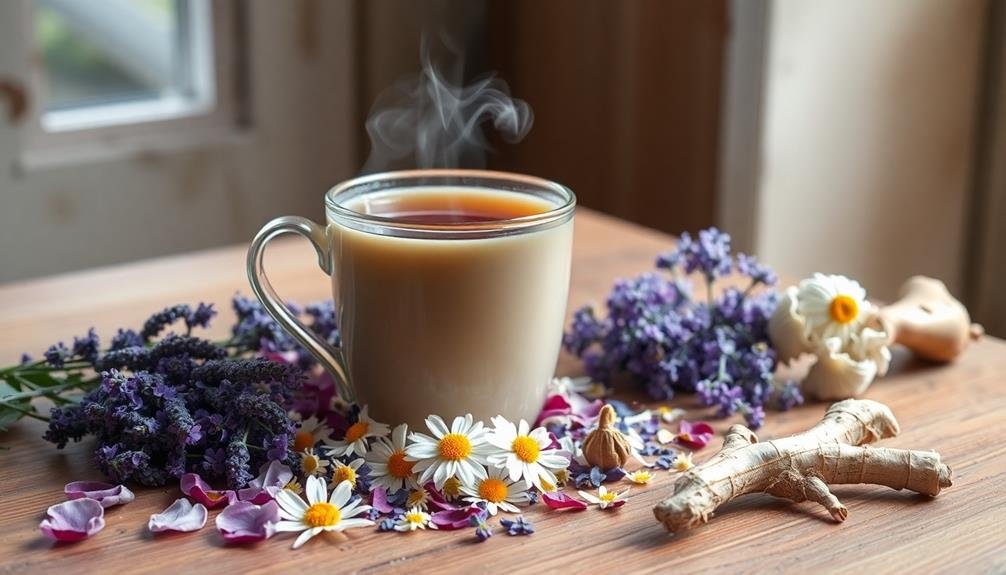
Beyond aromatherapy, you can enhance your passionflower tea experience by creating unique blends. Experiment with different herbs and flavors to find your perfect sleep-inducing combination. Start with a base of passionflower tea and add complementary ingredients to boost its effects and taste.
Here's a table of suggested blend variations to try:
| Blend Name | Ingredients | Benefits |
|---|---|---|
| Calming Chamomile | Passionflower, chamomile, lavender | Reduces anxiety, promotes relaxation |
| Sleepy Citrus | Passionflower, lemon balm, orange peel | Eases tension, improves mood |
| Minty Dreams | Passionflower, peppermint, valerian root | Relieves digestive issues, deepens sleep |
| Sweet Slumber | Passionflower, honey, cinnamon | Balances blood sugar, soothes nerves |
When creating your blends, remember to use high-quality, organic ingredients for the best results. Start with small amounts of each herb and adjust to your taste preferences. You can also experiment with adding a splash of milk or a natural sweetener like stevia to enhance the flavor. Don't be afraid to get creative and try unexpected combinations – you might discover a new favorite sleep aid that works wonders for your nightly routine.
Comparing Effectiveness With Other Remedies
While passionflower tea is a popular natural remedy for sleep issues, it's essential to compare its effectiveness with other common sleep aids. You'll find that passionflower tea offers unique benefits, but it's important to understand how it stacks up against alternatives.
When comparing passionflower tea to other sleep remedies, consider the following:
- Melatonin supplements: Often more fast-acting but may cause morning grogginess
- Chamomile tea: Similar calming effects but potentially less potent
- Valerian root: Stronger sedative properties but may have more side effects
- Lavender: Primarily used for aromatherapy, less versatile than passionflower
- Prescription sleep medications: More powerful but carry risks of dependency
You'll find that passionflower tea offers a gentle, natural approach to improving sleep quality without the risk of dependency or severe side effects. It's generally well-tolerated and can be easily incorporated into your nightly routine.
However, its effects may be more subtle compared to stronger sleep aids. If you're dealing with chronic insomnia or severe sleep disorders, you might need to consult a healthcare professional for more potent solutions.
Ultimately, the effectiveness of passionflower tea varies from person to person, so it's worth trying to see if it works for you.
Frequently Asked Questions
Can Passionflower Tea Be Consumed During Pregnancy or While Breastfeeding?
You shouldn't consume passionflower tea during pregnancy or while breastfeeding. It's best to avoid it due to potential risks. Always consult your healthcare provider before using any herbal products during these sensitive periods.
How Long Does It Take for Passionflower Tea to Induce Sleep?
You'll typically feel passionflower tea's sleep-inducing effects within 30-60 minutes after drinking it. However, individual responses may vary. It's best to consume it about an hour before bedtime for ideal results. Remember, it's not an instant fix.
Is It Safe to Drive After Drinking Passionflower Tea?
You shouldn't drive after drinking passionflower tea. It can cause drowsiness and impair your reaction time. While it's not as strong as sleep medication, it's best to wait until you're no longer feeling its sedative effects before driving.
Can Children Safely Consume Passionflower Tea for Sleep Support?
You shouldn't give passionflower tea to children for sleep support. It's not recommended for kids due to potential side effects. Instead, focus on establishing good sleep hygiene and routines. If sleep issues persist, consult a pediatrician for safe alternatives.
Does Passionflower Tea Interact With Any Common Medications or Supplements?
You should be cautious when consuming passionflower tea with medications. It can interact with sedatives, blood thinners, and some antidepressants. Always consult your doctor before combining it with any prescription drugs or supplements you're taking.
In Summary
You've now got a soothing passionflower tea blend to help improve your sleep. Remember to experiment with different ratios and complementary herbs to find what works best for you. Don't forget to store your blend properly and consider adding natural sweeteners or aromatherapy elements for enhanced effects. While this tea can be a great natural remedy, it's important to compare its effectiveness with other sleep aids and consult your doctor if sleep issues persist.

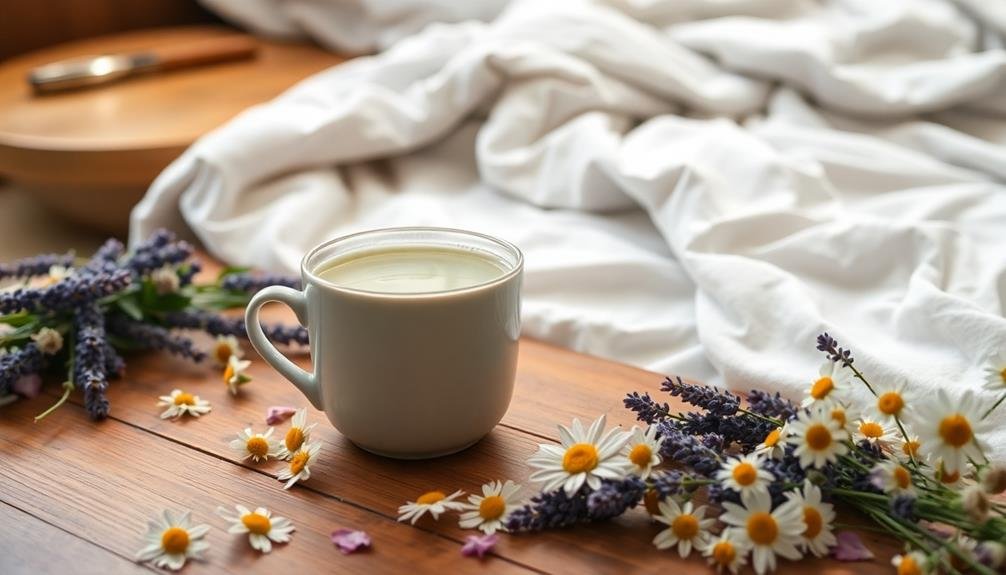
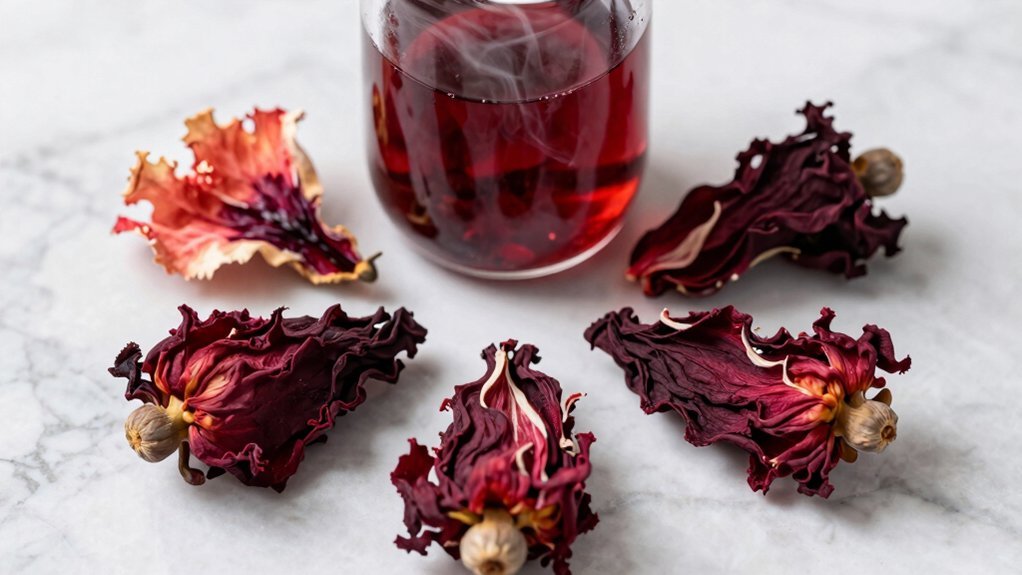


Leave a Reply